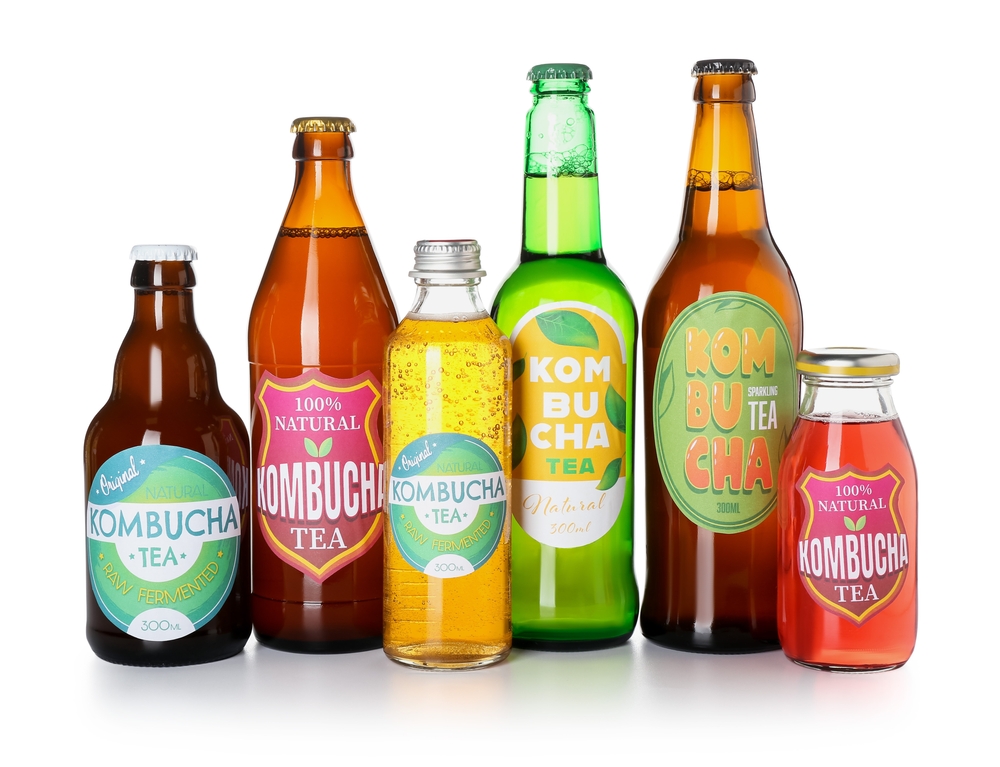The average 8 oz serving of homebrewed kombucha has 30 calories. Grocery store brands tend to be slightly higher in calories, averaging around 50 per 8 oz serving. During fermentation, the bacteria eat the sugar, lowering the number of calories in kombucha and producing carbonation.
Table of Contents
Average Nutrition Values in Kombucha
An 8 oz serving of raw, homemade, unflavored kombucha contains:
| Nutrition | Amount |
| Calories | 30 |
| Sugar | 4 g |
| Fat | 0 g |
| Cholesterol | 0 g |
| Carbohydrates | 7 g |
| Fiber | 0 g |
| Protein | 0 g |
Any fruit or puree you add at home during the second fermentation will increase the number of calories and sugars.
Kombucha contains numerous B Vitamins, including over 100% of the recommended daily intake of B12. Kombucha also contains Vitamin C and probiotics.
If you enjoy store-bought kombucha, watch for varieties with added sugars or fruit juice, as those products can drastically increase the sugar content in your kombucha. Homemade kombucha averages 4 grams of sugar per 8-ounce serving, while grocery store kombucha averages 12 grams.
How Does Kombucha Have So Few Calories?
Kombucha has few calories even though it is made from sweet tea. It has so few calories because the SCOBY (symbiotic culture of bacteria and yeast) eats the sugars as it ferments.
During the fermentation process, over 90% of the sugar is converted into alcohol. The alcohol later turns to different kinds of acid, including lactic acid and acetic acid, which are beneficial for the body. The resulting fermented tea is full of antioxidants and good for gut health.
What Are the Health Benefits of Drinking Kombucha?
Like other fermented foods, kombucha can be a beneficial addition to your diet. Notable health benefits of kombucha include:
- Improved digestion: The probiotics and lactic acid in kombucha may increase your digestive health. Drinking kombucha before a meal may help you digest food more easily.
- Reduced blood sugar levels: Kombucha made with green tea may help maintain blood glucose levels.
- Reduced inflammation: Tea can lower inflammation in the body, helping prevent heart disease.
- Reduced liver toxicity: Studies on rats suggest that kombucha aids liver function.
- Reduced risk of cancer: Early studies show that kombucha polyphenols may inhibit cancer cell growth.
Kombucha contains live cultures and microorganisms. It may not be a healthy choice for those with compromised immune systems, pregnant women, or nursing mothers. Check with your doctor or a nutritionist to see if kombucha is a good choice for you.
Is Kombucha Good for Weight Loss?
Kombucha tea may aid in weight loss. It is made from fermented black tea or green tea. Kombucha made with green tea may help you burn more calories by raising your metabolism. Drinking kombucha can leave you with a feeling of fullness, satiating your appetite.
This fermented beverage has fewer calories than soda, making it an excellent substitute for sugary drinks. Because the tea is carbonated, you won’t miss the fizz.
2 Ways to Lessen the Calories in Your Homemade Kombucha
There are two easy ways to lessen the calories in your homemade kombucha.
- Ferment your brew for a longer time. The longer the SCOBY ferments the sweet tea, the fewer calories from sugar remain. Still, taste your kombucha daily to ensure you don’t ferment it beyond what you enjoy.
- Don’t add sugar during the 2nd ferment. Avoid adding fruits or fruit juice. Use spices and herbs instead.

How Kombucha Compares to Other Popular Drinks
Kombucha has 10 to 30% less sugar than fruit juice or soda and is full of natural probiotics and antioxidants that promote gut health.
| 8 oz drink | Calories | Sugar | Carbs |
| Coca-Cola | 100 | 26 g | 26 g |
| Dr. Pepper | 100 | 26 g | 27 g |
| Mountain Dew | 100 | 26 g | 28 g |
| Ginger Beer* | 186 | 48 | 48 |
| Kefir* | 61 | 15 g | 16 g |
| Lemonade* | 73 | 19 g | 19 g |
*Values are subject to change depending on the brand.

